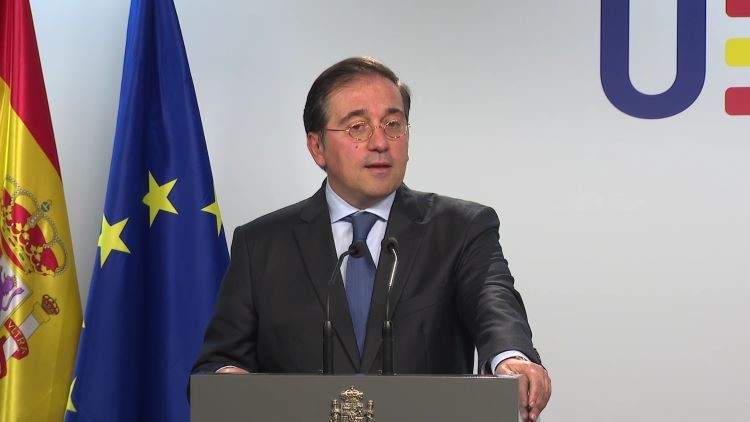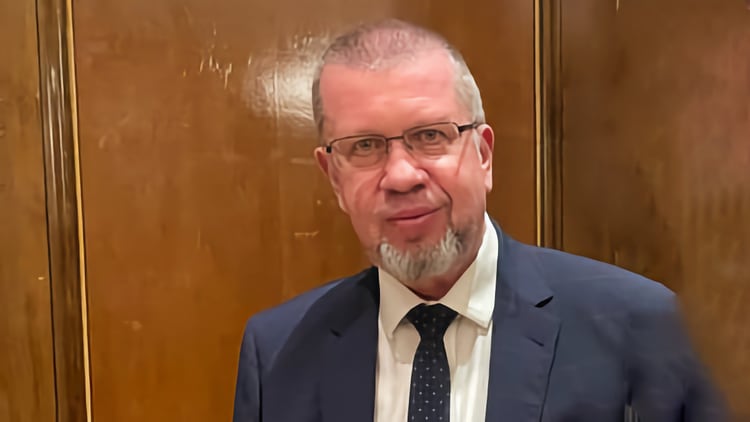Eduardo González
Yesterday in Brussels, the Minister of Foreign Affairs, José Manuel Albares, asked the High Representative of the European Union for Foreign Policy, Josep Borrell, to present at the next EU Foreign Affairs Council (FAC), which will take place in March, an assessment on “possible non-compliance with International Humanitarian Law by Israel based on the EU-Israel Association Agreement”.
“I have asked the high representative to make an evaluation of a possible breach of International Humanitarian Law by Israel based on the EU-Israel Association Agreement and to also indicate to us the conclusions that could be drawn from what he can verify,” Albares said at the press conference after the CAE this Monday, held in Brussels.
“I have asked him to present these conclusions to us at the next Foreign Affairs Council in March, and he himself has indicated to us that, once this happens, the Foreign Ministers will have to give him political guidance on how to act,” he added.
This request “is in line with what was requested by the President of the Government together with the Prime Minister of Ireland,” said the minister, in reference to the letter sent last week by the President of the Government, Pedro Sánchez, and the Prime Minister of Ireland, Leo Varadkar, in which they called on the European Commission to “undertake an urgent assessment” of Israel’s compliance with its human rights obligations arising from the EU/Israel Association Agreement, “and whether it considers that is not complying, to propose appropriate measures to the Council for it to take into consideration.”
“Both myself and my Irish colleague have made reference to the letter,” Albares explained, “I have been a little more explicit, and I have asked (Borrell) that, given the urgency of the situation at the moment in Gaza, At the next Foreign Affairs Council he can present some conclusions to us,” he continued. “The rest of the States have not taken the floor,” he assured. “Later, in a bilateral meeting I have been talking a little with him (Borrell) about the situation and we have been seeing what the legal basis is provided by the Association Agreement itself,” he added.
Once the evaluation has been submitted, it is possible to suspend the Association Agreement at the proposal of the High Representative or the Commission. For total suspension, unanimity of the 27 is required, while for partial suspension (for example, in commercial matters) a qualified majority is sufficient.
Sanctions on West Bank settlers
On the other hand, Albares announced that Spain has decided to unilaterally sanction Israeli settlers accused of violent acts against Palestinians in the West Bank, after Hungary’s veto has prevented a similar measure from being achieved in the EU as a whole.
“I have asked and have reiterated on several occasions the need to achieve unanimity to move forward with the sanctions regime for violent settlers in the West Bank,” he explained at the press conference. “Unfortunately, even though that was my goal and I have been pushing for it during the meeting, one State did not want to join,” he lamented. “There were 26 of us who agreed,” he said.
“Therefore, as I have announced inside the room, Spain is going to advance individually in the imposition of these sanctions,” Albares informed the media. This is a measure that “other countries have also announced that they are going to do”, as is the case of France, which last Tuesday announced the imposition of sanctions against 28 “extremist Israeli settlers” for acts of violence “against Palestinian civilians in West Bank.”
“I insist, we would have liked those sanctions, which were proposed by the high representative, to have been at the EU level, but for that we needed unanimity (…) and we cannot afford to wait any longer,” he added. Regarding the sanctions specifically, Albares assured that a “first list” is being prepared with the names of several “dozens” of people and that the measures could include “the possibility of an entry ban and the instruments that are at our disposal.”
UNRWA
Albares also took advantage of his intervention to defend the “essential” role of the United Nations Agency for Palestine Refugees (UNRWA), an organization that is in question after Israel has accused some of its workers of being linked to Hamas. and that around twenty donors have decided to provisionally withdraw their financial support.
“I have made it very clear that Spain is going to continue collaborating with UNRWA, that we are preparing a new financial package for UNRWA in addition to the 3.5 million euros that I already announced and the ten million that we delivered in December” and that “Spain will completely oppose the suspension, by the EU, of funding to UNRWA,” he said.
Red Sea
Furthermore, as announced, the Council yesterday launched EUNAVFOR ASPIDES, a defensive maritime security operation that aims to restore and safeguard freedom of navigation in the Red Sea and the Gulf. In the previous FAC in January, Albares made it clear that Spain would not veto but would not participate in this mission either. Spain had vetoed the possibility of extending the current Atalanta mission against piracy in the Indian Ocean to the Red Sea, but the decision of the 27 to create a new mission outside of Atalanta has not been enough to change the opinion of Pedro Sánchez’s Government.







